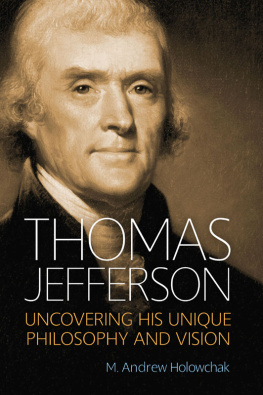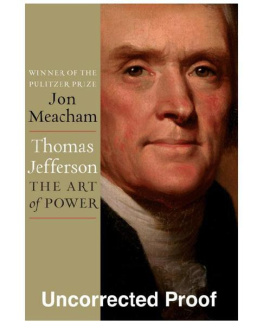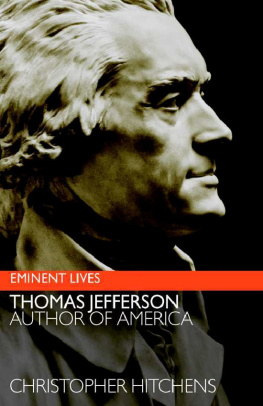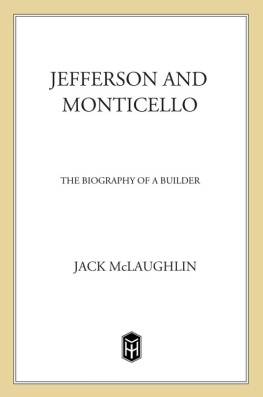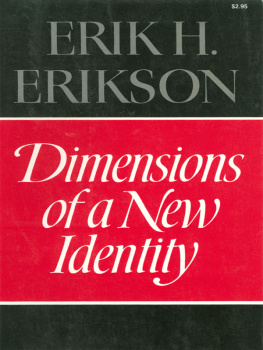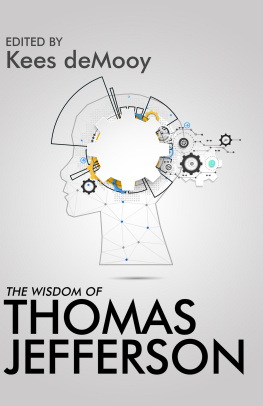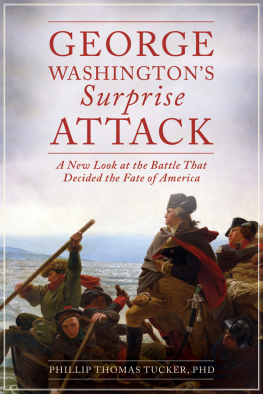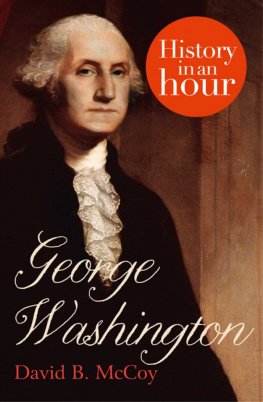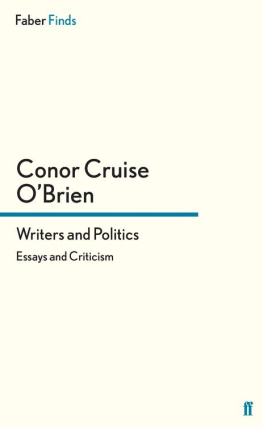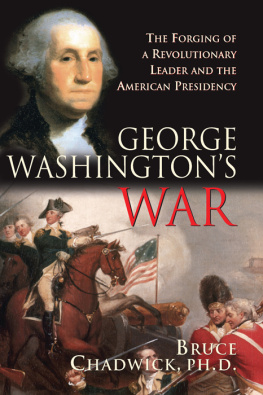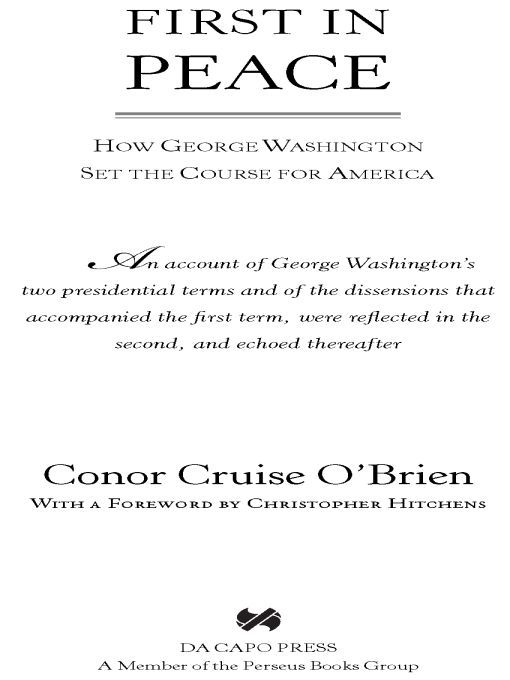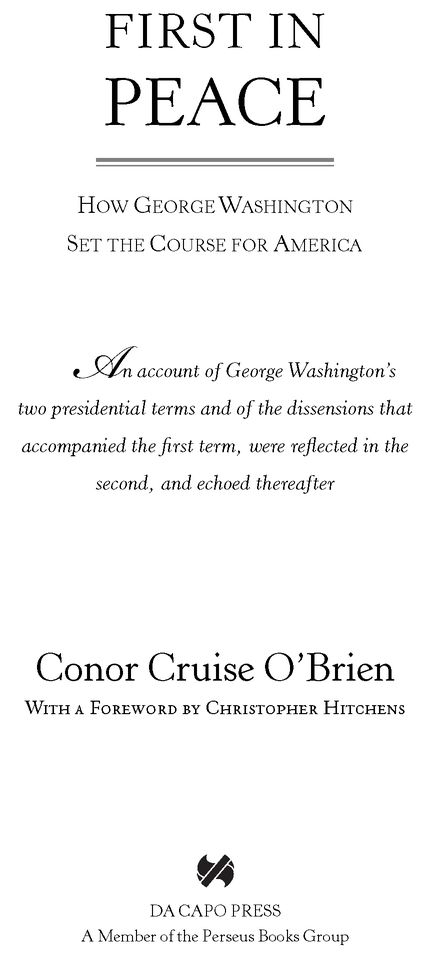Table of Contents
Also by
Conor Cruise OBrien
Parnell and His Party (1957)
Writers and Politics (1965)
To Katanga and Back: A UN Case History (1966)
Power and Consciousness (1969)
Shaping of Modern Ireland (1970)
States of Ireland (1974)
A Concise History of Ireland (1985)
The Siege: The Saga of Israel and Zionism (1986)
Passion and Cunning: Essays on Nationalism, Terrorism, and Revolution (1988)
The Great Melody: A Thematic Biography and Commented Anthology of Edmund Burke (1993)
On the Eve of the Millennium: The Future of Democracy Through an Age of Unreason (1995)
The Long Affair: Thomas Jefferson and the French Revolution, 1785-1800 (1996)
Memoir: My Life and Themes (2000)
God Land: Reflections on Religion and Nationalism (2001)
Foreword
Cruiser
Christopher Hitchens
HOPING AS I AM to introduce both a book and a man, I here present to you Dr. Conor Cruise OBrien, a man born in the year (indeed in the month) of the Russian Revolution and a man whose political and literary career has been devoted to the elucidation of French and American ones. Internationalist as Cruise OBriens career as a scholar and diplomat and politician has been, his Irish-ness has been no obstacle to him in the teasing out of the larger questions of our time. In this short volume, he crowns a long series of books and essays that have argued that the French Revolution, so far from being the continuation or extension of the American, was in fact a negation and not a consummation of the principles of 1776.
Cruise OBrien is well aware that this conclusion conflicts with the most cherished hopes and dreams of a certain liberal or Left tradition, which some have even called Jeffersonian. And it ought to be understood that his own re-evaluation of leftist and radical principles was neither an easy one in itself, nor conducted on a primrose path. There was a time when supporters of Irish independence, American independence, and French Jacobin ideals could all join to sing the same tune. Thomas Paine was one such and deserves honor for his efforts. But for Cruise OBrien, such simplistic enthusiasm ignores the ever-present risk of tragedy and irony, not to mention the ever-threatening element of the will to power. Ever since his celebrated introduction to Edmund Burkes Reflections on the Revolution in France, published in 1968, he has been repeating (perhaps I should say updating) the admonitions of Burke against revolutionary zealotry.
Burke, in Cruise OBriens view, was indirectly pleading the Irish cause when he defended the American colonists and vilified the French regicides. Only by this close reading of the Reflections could we come to understand that Burkes stand on matters was not in fact as flatly conservative, let alone reactionary, as it seemed. Burke, so often thought of as an English royalist and Tory, was in fact an Irish Whig and quite possibly, in the time of penal laws imposed by Protestants, a closet Catholic. This furnishes us with a nice counterpoint in Conor Cruise OBrien, an Irish secularist with a socialist formation, who became among other things the editor-in-chief of a liberal London newspaper. But it was his service to Ireland that convinced him above all of the folly and wickedness of absolutist and righteous and messianic movements.
After the somewhat rare experience of a nonsectarian upbringing and education in strongly Catholic Ireland, Cruise OBrien became a member of his countrys diplomatic service. He served as minister in Paris from 1955 to 1956 and, after Ireland joined the United Nations in 1955 (which its wartime neutrality had prevented it from doing hitherto), as a member of the Irish delegation. In 1961 he was asked by Secretary-General Dag Hammarskjld to act as his special envoy in the matter of Katangas secession from the newly independent Congo. This led him into direct collision with the British and American governments, whose policy toward the issue he found to be cynical and duplicitous. For the remainder of the decade, Cruise OBriens name was closely associated with the anticolonial and Third World independence movements. He served as chancellor of the University of Ghana in the days of Kwame Nkrumah, and then as Albert Schweitzer Professor of Humanities at New York University. He also took a leading part in the cultural and intellectual battles of the Cold War, and he was one of those who first exposed the secret CIA funding of the prestige magazine Encounter. A volume of essays, Writers and Politics, published during this time, shows him firmly on the Left and wielding a pen that could strike real fear into an antagonist. (If I may be allowed a personal note, I remember picking up this book in a public library in Tavistock, Devon, in the summer of 1967 and forming the ambition to be able to write in that vein.)
Cruise OBriens return to his native Ireland, and his election as a Labour member of the Irish parliament in 1969, coincided with the reopening of the long-dormant crisis in the northern part of the country. A civil rights movement against the Protestant-dominated mini-state led to repression and state violence, which resulted in such a breakdown of order that British troops were deployed on the streets. And the Republican movement, which had long eschewed the use of physical force, underwent a split that led to the emergence of the so-called Provisional IRA and the use, once again, of the gun in Irish politics. This development was a hinge event in Cruise OBrien evolution. Unlike many on the Left, he declined to identify the lethal romanticism of the IRA as a liberation struggle, preferring to classify it as a green form of fascism. His commitment on this point led him to join a coalition government, which took stern measures against the IRA and its sympathizers, and to write a book (States of Ireland), which is generally agreed to be the finest work, either literary or political, to have been produced by the whole imbroglio.
His trajectory since then has taken him (in the view of many, including myself) too far over to the Right and for a time even as far as an actual embrace of Ulster Unionism. This is not the place to rehearse these disagreements: rather it is the place to emphasize that Cruise OBriens arguments have always been intelligible and internally consistent. This is particularly true of his fidelity to Burkean principles as these are applied to the contemplation of (and opposition to) radical violence.
Most Americans are raised to think of their third president, Thomas Jefferson, as a man of immense learning and dignity: a man of many parts who gave us the noble words of the Declaration of Independence, the tranquil lawns of the University of Virginia, and the huge benefits of the Louisiana Purchase. Recent years have brought some distressing disclosures about his long affair with one of his slaves, Sally Hemings, and the children that she bore him. Earlier hagiographic historians, such as Dumas Malone, had downplayed or discounted this possibility. But it was another Long Affair (as Cruise OBrien entitled his 1996 study of Jefferson and the French Revolution) that was to deal an even harder blow to his reputation.


